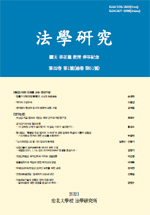상가건물 임차인의 갱신거절 통지와 묵시적 갱신 - 대법원 2024. 6. 27. 선고 2023다307024 판결에 대한 평석을 중심으로
Tenant’s Notice of Non-Renewal and Implied Renewal in Commercial Lease Agreements : An Analysis of Supreme Court Decision 2023Da307024, Rendered on June 27, 2024
- 충북대학교 법학연구소
- 법학연구
- 第36卷 第1號
-
2025.06177 - 197 (21 pages)
-
DOI : 10.34267/cblj.2025.36.1.177
- 11

A lease is a contract that takes effect when the lessor agrees to allow the lessee to use and benefit from the leased object, and the lessee agrees to pay rent in return. While a lease generally terminates upon the expiration of its term, its duration may be extended either through a renewal by agreement between the parties or by implied renewal under certain statutory conditions. The case analyzed in this article concerns whether the existing commercial lease contract could be deemed renewed when the lessee notified the lessor of the intention to refuse renewal only one day before the expiration of the lease term. This issue arises because, despite the similarities in lease types, different interpretations may result depending on whether the general Civil Act or special statutes such as the Housing Lease Protection Act or the Commercial Building Lease Protection Act apply, as each law prescribes different rules on renewal. This paper examines the statutory provisions on lease renewal under Korean law, particularly focusing on the rules governing the refusal of renewal by both lessors and lessees. It assesses whether the interpretation presented in the court’s decision is reasonable and appropriate. Furthermore, building on this case commentary, the paper explores whether the current provisions regarding the renewal of commercial building leases are fair and reasonable for both lessors and lessees. Based on this analysis and with reference to comparative legislative examples, this article proposes specific legislative amendments to the Commercial Building Lease Protection Act, particularly concerning the lessee’s right to refuse renewal. In both residential and commercial leases, it is essential to strike a balance between the lessee’s right to residential stability and the lessor’s right to protect their property interests. The predictability and stability of the lessor’s position are just as important as the protection of the lessee. If legal balance and harmony between the two parties can be achieved in commercial lease agreements, disputes like the one addressed in this case can be effectively prevented.
Ⅰ. 사실관계
Ⅱ. 법원의 판단
Ⅲ. 평석
참고문헌
(0)
(0)